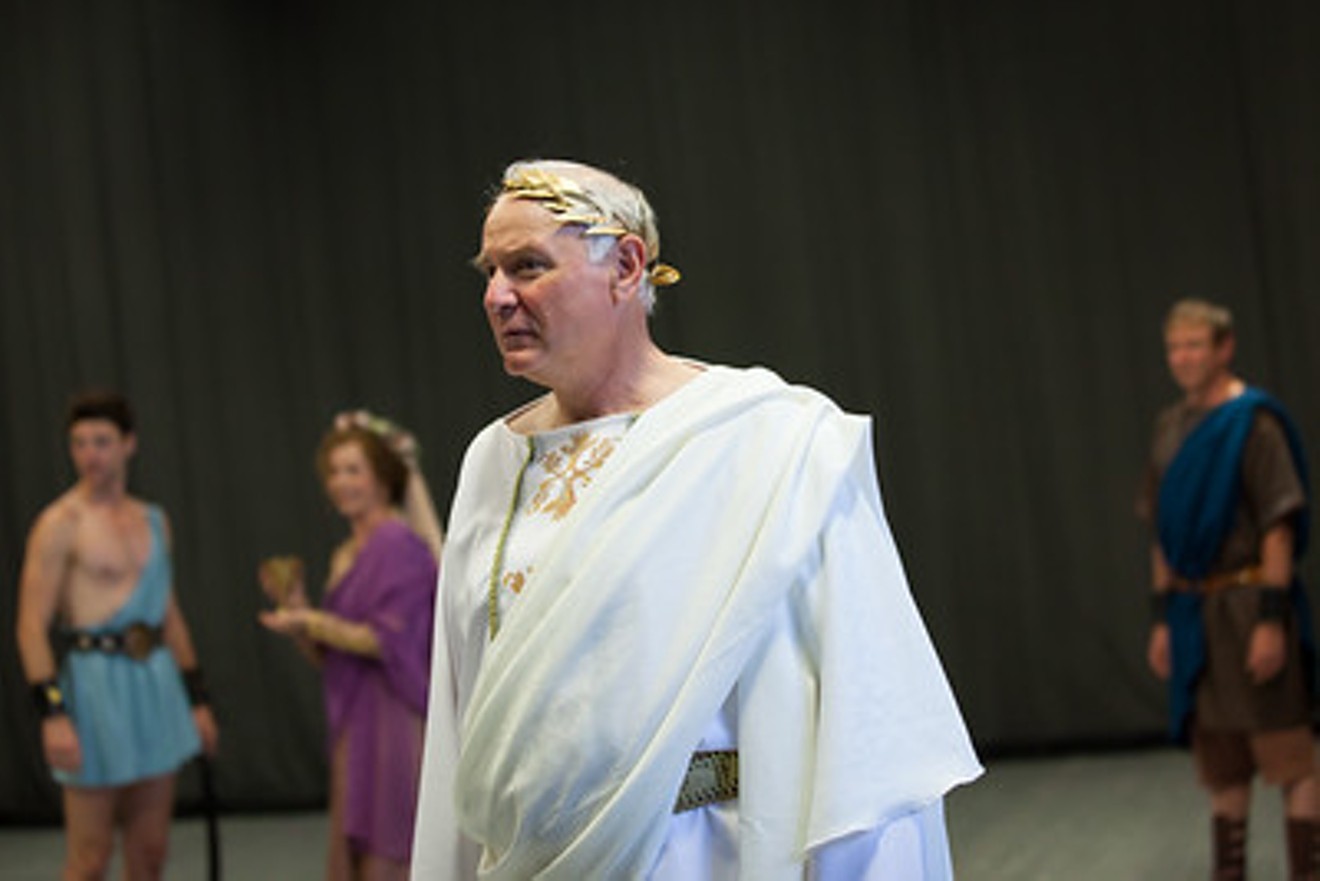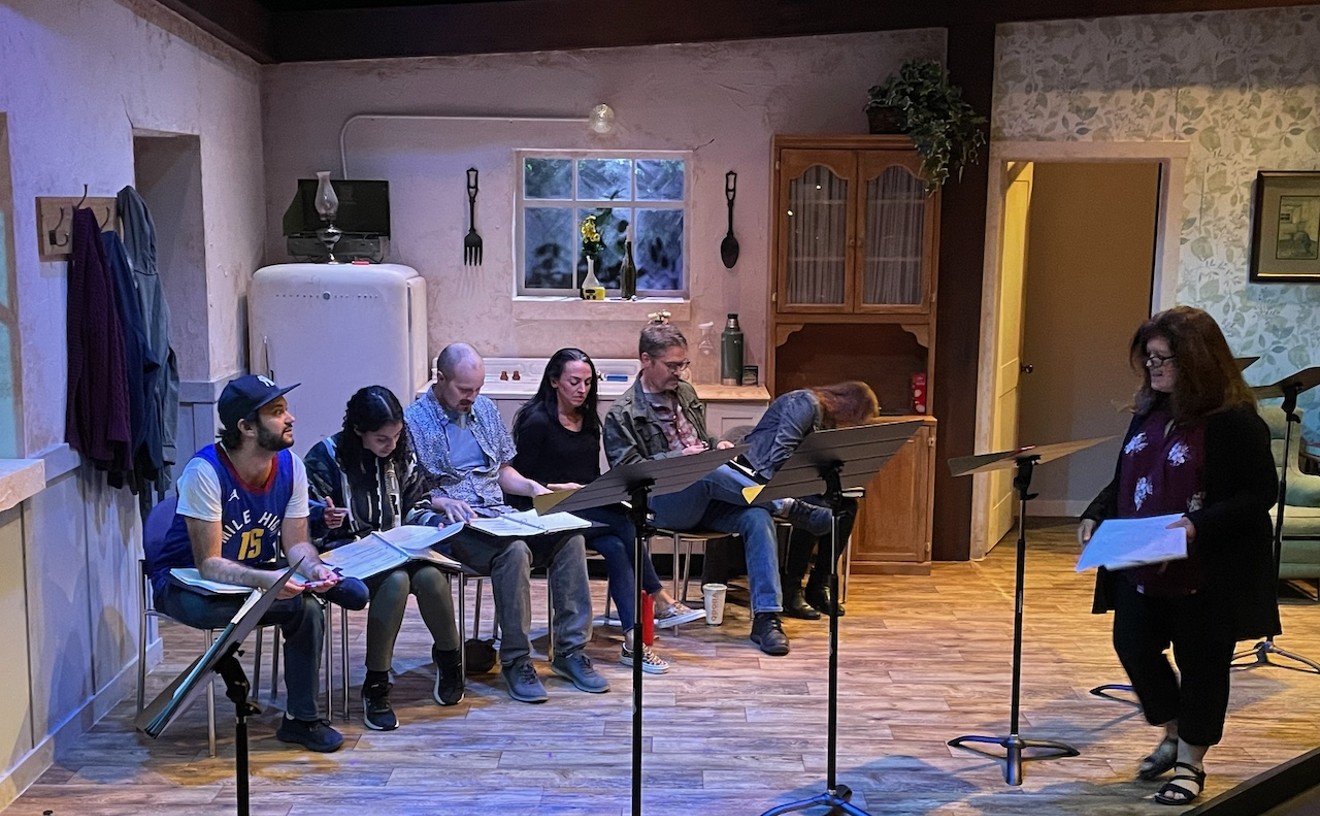Anthony Powell, who's directing the Colorado Shakespeare Festival production of Julius Caesar, hasn't paid much attention to the controversy surrounding the version staged by the Public Theater in New York's Central Park, in which Caesar — who's bloodily assassinated in the play — is given a distinctly Trumpian appearance and a wife with an Eastern European accent. The interpretation raised a storm of furious criticism from Trump supporters and caused the Bank of America and Delta Airlines to pull some of their sponsorship for the Public's Shakespeare in the Park program.
"It doesn't impact our work one way or the other," says Powell. "It's a lot of nothing. The director had to have known he was courting controversy, and I'm sure they got what they wanted."
Whatever director Oscar Eustis's intentions, inserting President Donald Trump into the action skews the meaning of the play, whether audiences see the interpretation as hostile to the president or presenting him as a martyr. Shakespeare's Caesar is an ambiguous character. His assassins believe — or say they believe — that he will use his popularity to assume absolute power and destroy the republic. "You'll never catch Shakespeare coming down on one side or the other," Powell says. "He raises the questions." As for Caesar, "It is to a great degree in the eye of the beholder. Everyone has a different opinion. You see a wonderful, loving husband, someone obviously involved in his own power, a good friend and a good ruler. He haunts the play, and his name is mentioned after his death hundreds of times." Powell is delighted he was able to get Robert Sicular, best known locally for his highly praised work at the Denver Center, for the role: "You need a formidable guy to play him."
Politics obviously plays a huge role in Shakespeare's play, and the issue of assassination is key. After the death of Caesar, the conspirators fall out with each other, and bloody war ensues. "The Elizabethans had a horror of civil war," Powell points out, "and that's ultimately what happens. The signs are everywhere beforehand that this act of terror should not be done. The history lesson we refuse to learn — this idea that somehow you're going to use violence and terror and the results will be fabulous, that it isn't going to turn around and bite your head off. This play is always politically relevant. Assassination is always an issue. Shakespeare could have written that assassination scene offstage, as he often does with violent scenes, and had it recounted by a messenger. He doesn't. We are supposed to watch this act of terror acted out."
Unlike many Shakespeare directors, Powell hasn't chosen to play with period and setting, but has decided to honor the work's time and place: ancient Rome. Much of the work's emotional heart is in the battered and battering friendship between Brutus and Cassius, two of the conspirators. "It's so much about honor and what it means to be a Roman man," says Powell. "These people are obsessed with those ideals, and they seem to fail at every turn. I don't know that honor, the kind of friendship and brotherhood they're talking about is valued today. Roman brotherhood was not just an emotional relationship. It was a social contract you entered into: 'This is my brother.'"
He points out that the scenes between the men and their wives are also deeply moving. In each case, the wives understand the danger their husbands are walking into, while "the men are so blinkered."
Julius Caesar was the first Shakespeare play Powell ever read in high school. His teacher, "Mrs. DeLuca, had all these old British recordings from the ’60s. She would drop the needle on the record, and we would read along with Peggy Ashcroft, Michael Redgrave, John Gielgud.
"I remember going, 'Oh, this is a political thriller. This is great.' And it still is great!"
Julius Caesar, July 7 through August 12, Mary Rippon Theatre, 1030 Broadway, CU Boulder campus, $10-$70, 303-492-8008. For more information, visit CU Presents online.
[
{
"name": "Air - MediumRectangle - Inline Content - Mobile Display Size",
"component": "12017618",
"insertPoint": "2",
"requiredCountToDisplay": "2"
},{
"name": "Editor Picks",
"component": "17242653",
"insertPoint": "4",
"requiredCountToDisplay": "1"
},{
"name": "Inline Links",
"component": "18838239",
"insertPoint": "8th",
"startingPoint": 8,
"requiredCountToDisplay": "7",
"maxInsertions": 25
},{
"name": "Air - MediumRectangle - Combo - Inline Content",
"component": "17261320",
"insertPoint": "8th",
"startingPoint": 8,
"requiredCountToDisplay": "7",
"maxInsertions": 25
},{
"name": "Inline Links",
"component": "18838239",
"insertPoint": "8th",
"startingPoint": 12,
"requiredCountToDisplay": "11",
"maxInsertions": 25
},{
"name": "Air - Leaderboard Tower - Combo - Inline Content",
"component": "17261321",
"insertPoint": "8th",
"startingPoint": 12,
"requiredCountToDisplay": "11",
"maxInsertions": 25
}
]












